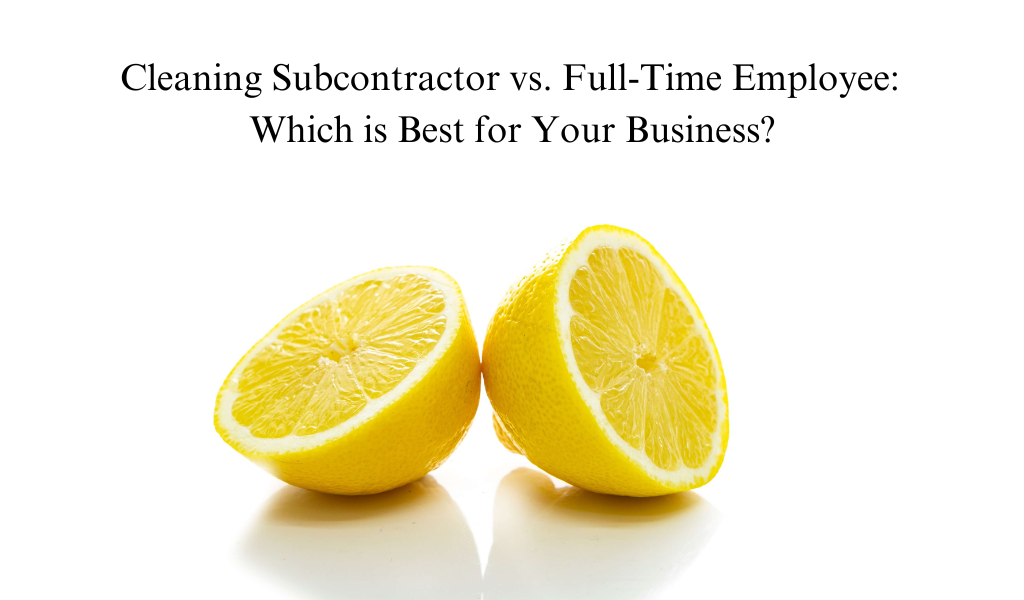Should you hire a commercial cleaning subcontractor or a full-time employee? Here are the pros and cons of each.
Congratulations! Your commercial cleaning business is growing and you need to bring in some help. This is a moment to celebrate, but it’s also a time for thinking about whether it’s better for your business to hire a cleaning subcontractor, or make the commitment to hiring someone full-time.
Both of these options come with some benefits and some drawbacks. Deciding which is best for your business is really a matter of looking at the differences and determining which fits best into your current situation.
While in both cases, the person will do the same work, how they do it and how it impacts your business can be vastly different. Here’s a look at some of those differences, along with the pros and cons of each.
Ready to strengthen employee and customer relationships? Let’s start the conversation! Reach out today for more info.

What’s the difference? Hiring a cleaning subcontractor vs. hiring an employee
On paper, the difference between a cleaning subcontractor and a full-time employee is fairly clear. In reality, it can be a little confusing. The two may do the exact same job, use the same products and equipment, and may even work alongside each other. However, the IRS treats the two positions differently. As well, you have certain obligations and rights with employees that you don’t have with subcontractors. Here are some of the most significant differences.
Taxes:
With a full-time employee, the employer is responsible for withholding income taxes, social security taxes, Medicare taxes, and any state or local payroll taxes. The employer is also liable for the employer portion of social security and Medicare taxes, as well as unemployment taxes.
With contractors, you are usually not responsible for any of this. You pay the contractor and they handle their own taxes.
Pros and cons: While it might seem like it’s more expensive to hire an employee, due to the additional taxes, contractors may demand higher wages, so this one could go either way. And if you’re worried about all the paperwork involved, many third-party payroll providers, such as ADP or Gusto, will handle the details for you.
Wages:
When you hire an employee, you set the wages (bearing in mind the above taxes are included). You make an offer and employees can take it or leave it. Of course, you still have to follow things like minimum wage laws. But your employees don’t have a lot of room to negotiate.
A cleaning subcontractor, on the other hand, sets their own rate. And as noted above, these rates may be higher than what you would pay in wages, since a contractor is responsible for their own self-employment taxes. You can negotiate, of course. Some people may accept a lower rate in return for steady, long-term work.
Pros and cons: Like taxes, the issue of wages could easily go in either direction. One thing to note here is that while employees are usually on a regular pay schedule, contractors will give you an invoice and may expect payment weekly, bi-weekly, or monthly.
Supplies:
In most cases, you’ll be expected to provide the necessary supplies and equipment for employees to do their job.
Contractors may or may not provide their own supplies and equipment.
Pros and cons: Whether this is positive or negative is largely situational. For example, if you don’t have a good steam cleaner, and hire a cleaning subcontractor with their own, you don’t have to worry about buying the equipment or the upkeep. However, equipment purchases can improve the quality of your commercial cleaning business, and there are tax advantages to these purchases.
Uniforms:
If you have a dress code, say polo shirts with your business logo, you can tell employees they have to wear them.
Contractors have no obligation to dress a particular way. Nor can you require them to were your branded shirts.
Pros and cons: This one is pretty straightforward. If you want the people working for you to maintain a certain appearance, employee is the way to go. If you just want someone who will get the job done and don’t care how they’re dressed, you could go with a contractor here.
How the job is done:
With employees, you can specify how a job gets done. If you want them to refresh the mop water every five minutes, as inefficient as that might be, it’s your call.
A cleaning subcontractor can perform a job however they see fit. As long as the end result meets your agreed-upon standards, the method is up to them.
Pros and cons: This depends on how much control you want over how a job gets done. However, if a subcontractor can meet your quality standards, there’s no reason to think that one is a better choice than the other.
Training:
This could potentially fit into the category of how a job is done, although it’s a bit more broad. With employees, there’s a good chance you’re providing training when you hire them, as well as potential ongoing training or certification.
A cleaning subcontractor will likely already know how to do the job and won’t require training. That’s not to say you can’t orient them to a facility or answer questions, particularly if they are using your equipment. However, training indicates that you are directing how the job is done. Here’s how the IRS puts it: “If the business provides the worker with training on how to do the job, this indicates that the business wants the job done in a particular way. This is strong evidence that the worker is an employee.”
Pros and cons: There’s certainly something to be said for bringing in a contractor who already knows how to do the job. Commercial cleaning businesses can spend a lot of time and effort training new hires and getting them up and running. Again, though, if you want a job done a certain way, you’re better off hiring someone.
Does it matter?
Outside of some of the obvious factors around how you want to run your business, there are serious considerations around hiring a cleaning subcontractor or a full-time employee. While it may seem easier to hire a contractor, there are some significant consequences to the “misclassification of employees.”
The IRS states that “If you classify an employee as an independent contractor and you have no reasonable basis for doing so, then you may be held liable for employment taxes for that worker.” It’s easy to see how that could add up quickly if you have several cases filed against you.
If you’re still in doubt, you can contact the IRS and file the “Determination of Worker Status for Purposes of Federal Employment Taxes and Income Tax Withholding.“
Hiring a full-time employee or going with a contractor can change the path of your business. Be sure to think through the pros and cons of each. Consider what you want from your business and what you want to offer the people working for you.
Take advantage of the value Janitorial Manager can bring to your cleaning operation to streamline your processes like never before. Learn more today with a discovery call and find out how to make your cleaning operation more efficient and cost effective!

